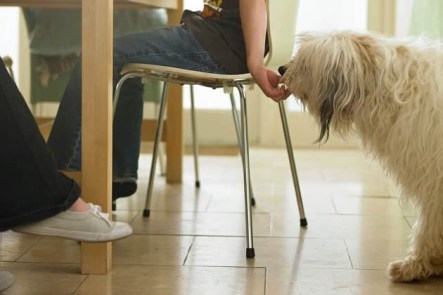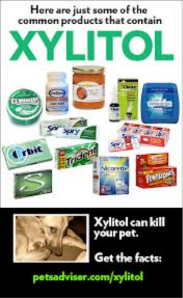If you are hosting a Thanksgiving fiesta or planning to take your dog to someone else’s home for holiday fun, your dog will be around lots of new types of food it would love to try, and you can be sure it will carefully comb the crowd for easy marks to give it a taste.
Unfortunately, many holiday foods are toxic to dogs and can either kill them or cause serious health problems.
Please take a look at this list and be sure to keep your dog away from these foods. More importantly, be sure to tell your guests, especially kids, not to feed anything to your dog.
Another thing you can do is empty garbage cans after you’ve made the meal and after clean up to keep potentially dangerous food away from dumpster diving dogs.
Here’s a list of foods to keep away from your dog:
- Onions or other alliums like garlic, leeks, shallots & scallions. Though small, well-cooked portions of this plant group can be okay when pets are accustomed to them, larger quantities can lead to toxic anemia — especially in dogs. Also, be careful with turkey stuffing. Many stuffing recipes include onions.
- Xylitol. Most people don’t cook with this sugar substitute, but diabetics often do. Anything with xylitol in it is toxic and absolutely deadly to dogs. Do not keep it in your house (or if you must, keep it safe and secure away from your animal). Sugar-free cupcakes, gums, and mints may also contain this product, so be careful all year round.
- Walnuts and Macadamia nuts. Within twelve hours of eating these nuts dogs can start to develop symptoms such as an inability to stand, ataxia (walking wobbly), depression, vomiting, muscle tremors, hyperthermia (elevated body temperature), weakness, and an elevated heart rate.

Be sure to tell your guests not to sneak any food to your dog. Image from Dogspired.
- Turkey Bones. Turkey bones (and chicken bones) are hollow and will splinter when your dog chews them. The sharp points of splintered bones can cause internal perforations in a dogs throat, stomach, or intestines that can lead to life threatening health problems. The bones can also get lodged in your dog’s throat and cause choking.
- Chocolate. Chocolate contains theobromine, a substance that can be toxic to pets. Dark, semi-sweet or Baker’s chocolate can be lethal to pets if ingested. Milk chocolate is less dangerous but should still be avoided.
- Tomatoes, Potatoes and Rhubarb. Parts of these contain oxalates, which can be toxic to dogs.
- Raisins and Grapes. These can cause kidney failure, even in small amounts.
- Pits from plums, peaches, cherries or other fruit. Pits contain cyanide, which is poisonous to dogs as well as humans. They can also create intestinal blockage.
- Nutmeg. Can cause seizures and central nervous system damage.
- Avocados. The fruit, pit and plant are all toxic. They can cause difficulty breathing and fluid accumulation in the chest, abdomen and heart.
If you suspect that your dog may have ingested one of these foods or another harmful substance, call the ASPCA Animal Poison Control Center at 888-426-4435.
Have a safe and happy holiday!






Contrary to the widespread belief, garlic and avocados are not *dangerous* for dogs. The avocado PIT is – not the fruit – and numerous studies have been done to show there are actually benefits to garlic but the results and research are still being debated. I highly doubt that Avoderm brand dog food, which contains avocado, would be allowed to be sold in such a widespread manner if it contained toxic ingredients. 🙁
Thank you for the info. I’ll take avocados off the list. Opinion is divided on whether or not garlic is toxic. I know it’s ok in small amounts but large amounts can be toxic.
This is great info! We were just talking about inviting our families dogs to come along with them next Thanksgiving…will print and file for this celebration!
As Thanksgiving approaches in the COVID-19 pandemic remember that your dogs can contract COVID-19. Buddy a 7 yo German Shepherd contracted COVID-19 from his owner in Statin Island NY and died June 11, 2020.
The SARS-CoV-2 virus is zoonotic (spreads between species like humans, dogs, bats etc). The CDC has excellent guidelines for you and your pup staying safe in this pandemic ESPECIALLY when going to vet.
Keep your “Buddy out of harm’s way!